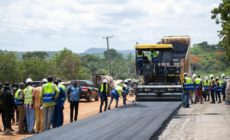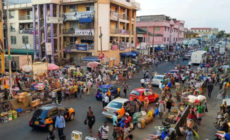Gov’t releases list of jobs created since last 4yrs: 600,000 jobs
- Posted on
- Comment
 Government has released a list outlining the number of jobs it has created in the last four years.
Government has released a list outlining the number of jobs it has created in the last four years.
According to the list, government has since 2013, created close to 600,000 jobs in the country.
A statement signed by the Minister of Communications, Dr. Edward Omane Boamah further said close to 96,000 others have also been trained to create their own jobs.
“These offer ample proof of both government’s commitment to create more employment opportunities for the youth and the pragmatic steps being taken to reduce this perennial global challenge to the barest minimum,” the statement added.
The statement follows criticisms of government’s job creation claims.
Currently reports indicate that there are about 200,000 unemployed graduates in the country and critics have predicted an increase in the number.
Head of the Economic Division at the Institute of Statistical Social and Economic Research (ISSER) Dr. Charles Ackah has also said Ghana is sitting on a time bomb due to the worsening graduate unemployment situation in the country.
This to him is because the state of the economic has drastically reduced both the government and the private sector’s capacity to employ people.
But President John Mahama has disclosed that the Youth Employment Agency(YEA) has so far employed about 93,000 since it was transformed from GYEEDA.
Unemployment high in urban centres
The Ghana Living Standards Survey for the year 2012/2013 however states that the unemployment rate in the country “is marginally higher for females (2.0%) than males (1.6%) and higher in urban areas (3.5%) than in rural areas (0.8%).”
The survey estimates that 250,000 young men and women enter the Ghanaian labour market every year with only 2% absorbed in the formal sector whilst the 98% seek employment in the informal sector or remain unemployed.
It adds that 98.1% of “Ghana’s working population – 10, 517,394 – are employed; putting unemployment at 1.9%. Among the age groups, the rate of unemployment is highest within the 15 to 24 age cohort (3.2%); males (3.3%), females (3.0%) and urban (7.2%).”
Below is the full statement from government:
GHANA’S ECONOMY SET TO CREATE MORE JOBS AS NEW PROJECTS COME ON STREAM
Government can assure that the economy is set to create more jobs in both the formal and informal sectors as various Ministries, Departments and Agencies complete different pipeline projects and implement new interventions.
With the economy having achieved considerable stability and expansion in addition to demonstrating resilience in the face of global economic challenges on the commodity market and the coming on stream of pipeline projects, we are convinced the recent discussions and concerns raised about the issue of job creation can be beneficial if it is situated within the context of specific measures taken to address the longstanding global and national challenge of unemployment.
Several interventions aimed at creating more jobs, as well as helping the private sector to expand and create job opportunities for the youth have been initiated.
While acknowledging the need for all stakeholders to do more to curb unemployment, we wish to give an account of some specific efforts in this regard not only to serve as an update but also to guide the youth seeking employment to explore the opportunities available:
- Through direct Government interventions and partnerships with the private sector, numerous jobs that have been created are as follows:
Between 2013 and 2015, Government through the Export Trade Agricultural and Industrial Development Fund (EDAIF) supported local industries to the tune of GHc 245.4 million. This amount funded over 125 different projects in the pharmaceuticals, rice, sheanut, poultry and textiles industries among others, thereby creating jobs for thousands of Ghanaians;
The Skills Development Fund, implemented by COTVET, has disbursed a total of GHc 150 million to 654 businesses, which have trained 93,600 people in vocational and technical skills across sectors of the economy. A total of 43,485 businesses have also received support under the Fund;
The printing and distribution of over 100 million exercise books under the free exercise books initiative has created thousands of jobs since its inception in 2010. The GHC100million worth of contracts for local printing of textbooks for schools will in addition create jobs for 4,000 people. Duties on importation of raw materials for printing textbooks have been removed to incentivise the industry; and
The distribution of over 2 million school uniforms under the Free School Uniforms Programme has also created thousands of jobs for people engaged in the production of these uniforms in the textiles industry.
- Additionally, the following programmes have created the corresponding number of jobs:
Under the Free Zones Board, a total of 69 companies were established between 2013 and 2015, leading to the employment of 16,372 people;
The Youth in Agriculture programme employed 23,000 youth in 2013 bringing the total number of young farmers in the programme to 81,150;
The National Vocational Training Institute (NVTI), Integrated Community Centres for Employable Skill (ICCES) and Opportunities Industrialisation Centres (OIC) have employed 21,802 people;
The Graduate Business Support Scheme run by the Ministry of Employment and Labour Relations has engaged 2,000 people;
The Department of Cooperatives registered a total of 1,757 Youth Co-operatives in 10 Regions with a total of 34,657 jobs created;
The Rural Enterprise Project created 21,045 jobs across the country between 2013 and 2015;
GRATIS foundation under the Ministry of Trade and Industry also created 500 jobs through the production of over 1,000 agricultural implements and
The Micro Finance and Small Loan Centre (MASLOC) has advanced micro credit to a total of 190,607 beneficiaries between 2010 and 2015.This has enabled the beneficiaries to set up micro businesses which are offering jobs to themselves and others. They have also distributed 953 vehicles for commercial transport, 25 tractors for agricultural use etc.
- Apart from these state sponsored employment creation ventures, both direct and indirect jobs have been created through the opening of the under listed stated owned companies or public private partnerships since 2010:
Kumasi Shoe Factory (DIHOC) – 200 jobs created;
Ghana National Gas Processing Plant, Atuabo– 265 jobs created;
The Oil and Gas Sector since 2010– 7,000 jobs created;
Shea nut processing plant at Buipe – 50 permanent staff (and 2,000 shea nut pickers).
- Notwithstanding the numerous verifiable job avenues that have been created over the past three to four years under the leadership of President John Dramani Mahama, this year brings more prospects for our enterprising youth ready to put their skills and industry at the disposal of the nation. Government, this year has began rolling out a number of interventions aimed at absorbing the youth. These include but not limited to:
- The Youth Entrepreneurial Agency (YEA) is in the process of employing a minimum of 100,000 youth under the following modules-
| MODULE | NUMBER OF PEOPLE | |
| TO BE RECRUITED | ||
| SANITATION | 45,000 | |
| SECURITY | SERVICES | 5,000 |
| MODULE | ||
| COMMUNITY | 10,000 | |
| TEACHING | ||
| ASSISTANTS | ||
| PAID INTERNSHIP | 5,000 | |
| HEALTH | EXTENSION | 10,000 |
| WORKERS | ||
| YOUTH | IN AGRIC | 20,000 |
| AND AGRI-BUSINESS | ||
| TRADES | AND | 20,000 |
| VOCATION | ||
| VACATION JOBS | 5,000 | |
- Also, the completion of major industrial projects this year will unleash more jobs:
The Business Process Outsourcing Centre near the Kwame Nkrumah Interchange has been completed and will create 10,000 direct and indirect jobs. Another IT Enabled Services Centre has been completed by the Ministry of Communications at the Tema ICT Park in the Free Zones Enclave and is already employing about 250 people;
The Komenda Sugar factory will also create 7,300 direct and indirect jobs (including outgrowers of sugar cane to feed the factory);
The new Fish processing factory at Elmina will create 2,500 direct and indirect jobs;
Tema Harbour Expansion will create 3,000 jobs
Takoradi Harbour Expansion will create 3,000 jobs
- Over 400,000 professionals such as architects, engineers, quantity surveyors, masons, carpenters, welders, steel benders, electricians and painters, among others, are currently employed at various sites where direct Government investment in the construction of hospitals, roads, schools, water, energy, housing and market projects are underway. When these projects are completed teachers, nurses, engineers, doctors, pharmacists and other professionals will be recruited to work in these facilities. These projects also have places for semi-skilled and unskilled labour.
- This government is empowering Ghanaian youth and business people to be more entrepreneurial and innovative through targeted policies and programmes. The first batch of 107 beneficiaries of the Youth Enterprise Support (YES) has received financial support to establish and grow their own businesses after receiving intensive training and mentoring in business management. The implementation of the President’s directive for GHc100 million worth of textbooks for schools to be printed locally is one such sign of empowerment being offered local businesses. This directive alone creates jobs for an estimated 4,000 As an additional motivation, duties on importation of raw materials for printing textbooks have been removed to boost the local printing industry to expand and employ more people.
- Jobs have also been created in the Agriculture Sector. The 2016 State of the Nation Address delivered by President John Dramani Mahama recounts a number of initiatives as part of
Government’s transformational agenda in the area of agriculture with job creation as a core objective. Notable among them include:
Distribution of 110 million cocoa seedlings to farmers, at no cost, in the 2014/2015 and the current 2015/2016 crop season. This has created 9,000 jobs across 418 nursery sites;
Government is encouraging more people able and willing, especially the youth, to enter into cocoa farming.
Government through COCOBOD has put together a motivation package to boost early growth and substantial return on investment. This package includes provision of effective extension support, free cocoa seedlings and free sulphate of ammonia fertilizers;
Since the programme was launched in 2014, over 30,000 youth have signed up in Ashanti, Central, Eastern and Western Regions;
This year, 5million improved, early-maturing and high-yielding coffee seedlings are being raised and supplied to farmers. The supplies will be substantially increased every year to ensure that coffee production increases from the present 6,000 hectares to 100,000 hectares of coffee farms in some targeted locations by 2021. These locations are in but not limited to parts of the Volta, Eastern, Central and the transitional areas of the Ashanti and Brong Ahafo Regions such as Techiman, Wenchi, Bechem, Nkoranza, Atebubu, Kwame Danso, Drobo, Akomadan, Offinso, Jamasi, Asante-Mampong, Kete Krachi and Dambai. Thousands of jobs will also be created along the coffee value chain;
The pilot phase of the Ghana Broiler Re-vitalisation Project was launched in July 2014. A total of 650,000 birds were raised, processed and sold by 2015. This created 350 direct jobs and 7,800 indirect jobs for poultry farmers and the youth along the poultry value chain;
The Ministry of Fisheries and Aquaculture Development is supporting the establishment of a Shrimp Project to promote processing and production for the Ghanaian market and for export. Production of fingerlings, laboratories, fish feed factories, production ponds, processing and marketing facilities will be located in parts of the Greater Accra, Volta and Eastern Regions. The project will create 76,000 direct and indirect jobs. Production is estimated to be 30,000 metric tonnes and projected export revenue ranges between US$60 million to US$200 million. The project is expected to commence by the close of this year;
Similar initiatives in oil palm and shea production will soon be launched.
These offer ample proof of both Government’s commitment to create more employment opportunities for the youth and the pragmatic steps being taken to reduce this perennial global challenge to the barest minimum.
The Role of the Private Sector
Government duly acknowledges and welcomes the role of the private sector, both formal and informal, in creating jobs and remains confident that with the resolution of the power supply shortfall and the relative stability of the macroeconomic environment, the economy will expand between now and the years ahead leading to massive job creation and economic empowerment for all. We shall continue to collaborate with the private sector in this endeavour. The optimism is also shared by our development partners.
The World Bank
It will be recalled that barely two weeks ago (12th April, 2016) the World Bank was on record to have stated in a report on Ghana’s economic outlook that, “Ghana’s real gross domestic product (GDP) growth is projected to rebound to 5.2% in 2016 from 3.4% in 2015 reflecting the positive impact of a more stable energy supply and increased contribution from the oil and gas and agriculture industries. Energy supply is expected to improve following the emergency measures including the use of power barges. The country’s medium-term growth prospect is strong with 8.2% in 2017 and moderating to 7.5% in 2018 under the assumption that fiscal adjustment remains on track with the support of the International Monetary Fund (IMF) and other development partners.”
BRIGHTER PROSPECTS
In conclusion, the Government of President John Dramani Mahama remains committed to fiscal discipline even as we implement zero percent (0%) financing from the Bank of Ghana, the lender of last resort. We shall sustain the gains and ensure they translate into more jobs to empower the citizenry. Let us continue to be hopeful, for, just as many have been employed in both the public and private sectors, there are many more job opportunities in the months and years ahead.
Signed:
EDWARD K. OMANE BOAMAH (DR.)
(Minister)
–
By: Godwin Allotey
– See more at: http://citifmonline.com/2016/04/25/weve-created-about-600000-jobs-govt/#sthash.rxijiGAD.dpuf










 (Selorm) |
(Selorm) |  (Nana Kwesi)
(Nana Kwesi)